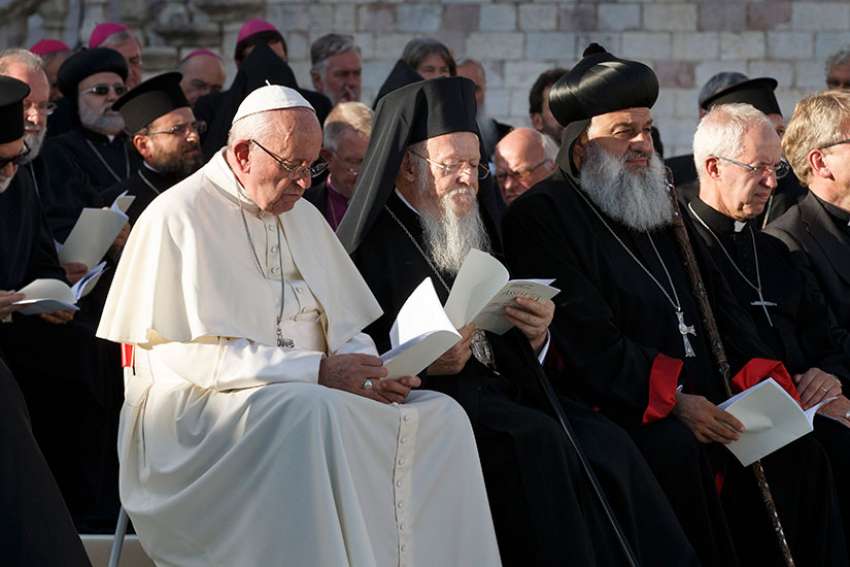While Patriarch Bartholomew's office did not release a detailed schedule of events he would be attending during the Pope's April 28-29 visit to Cairo, the Vatican confirmed reports April 19 that Patriarch Bartholomew was invited to take part in the conference and was planning to attend.
Pope Francis also was scheduled to meet Pope Tawadros II, head of the Coptic Orthodox Church, soon after the conference April 28, making it a day the heirs of the Apostles Peter, Mark and Andrew all would be present in the ancient land of Egypt.
While Pope Francis is the successor of St. Peter, the Orthodox ecumenical patriarchate traces its lineage to St. Andrew and the Coptic Orthodox Church has St. Mark as its patron. The Catholic, Eastern Orthodox and Oriental Orthodox churches are not in full communion with each other, although they have been working closely together and have been engaged in theology dialogue aimed at unity.
The Orthodox patriarch of Constantinople is called the ecumenical patriarch and is considered "first among equals" for the Eastern Orthodox churches, even though his primacy does not entail direct or ultimate jurisdiction over them.
The Coptic Orthodox Church is one of six Oriental Orthodox churches that trace their roots to apostolic times, but distanced themselves from the rest of Christianity after the Council of Chalcedon in 451.
Like the Eastern Orthodox churches, the Oriental Orthodox accept seven sacraments and allow ordination of married men to the priesthood but choose their bishops only from among celibate priests. They are in communion with one another but not with the Catholic Church or the Eastern Orthodox churches that split with Rome beginning in the 11th century.
Egypt's indigenous Christian community traces its faith all the way back to Jesus who, according to the Gospel of St. Matthew, sought refuge in Egypt from the wrath of Herod the Great 2,000 years ago.
Coptic Orthodox tradition holds that Christ stayed in Egypt for three years and that later, around the year 42, St. Mark the Evangelist arrived to evangelize in the Egyptian port city of Alexandria, before being martyred there.
Christianity continued to spread and by the third century, Christianity was the country's dominant religion. By the time the newer religion of Islam arrived in Egypt in the middle of the seventh century, Egyptian Christianity had already provided the church with some of the world's major Christian saints and had introduced new forms of monastic life.
The Coptic Orthodox Church, led by Pope Tawadros, represents 95 percent of all Christians in Egypt. The other local Christian groups include Protestants and Catholics from different rites, including Coptic, Melkite, Maronite, Syrian, Armenian, Chaldean and Latin.
Egypt's Coptic Catholic Church is the largest of the Catholic rites in the country and accounts for as many as 300,000 faithful. Both Coptic Catholics and Coptic Orthodox refer to their respective leaders as "patriarch of Alexandria" and see themselves as the "original" Egyptians because of their ancient ties to the land.


